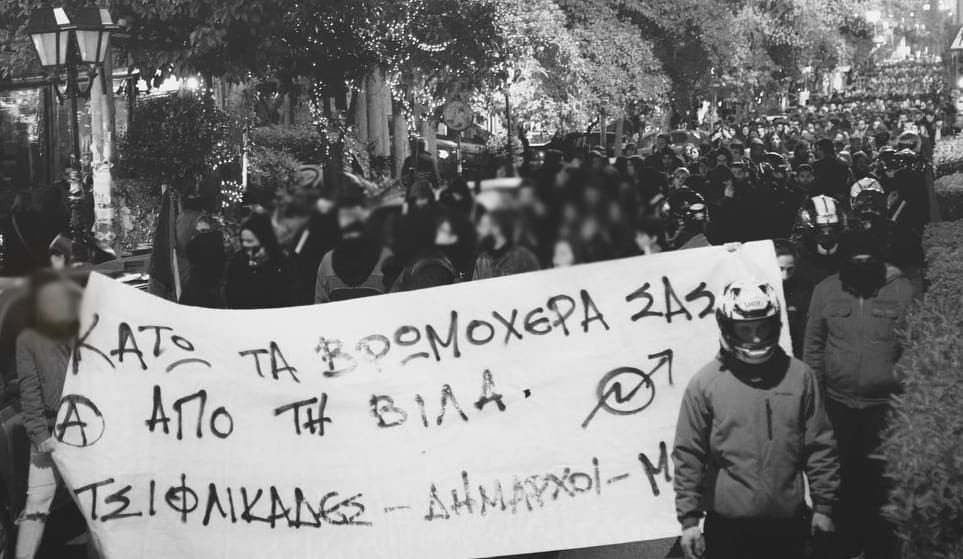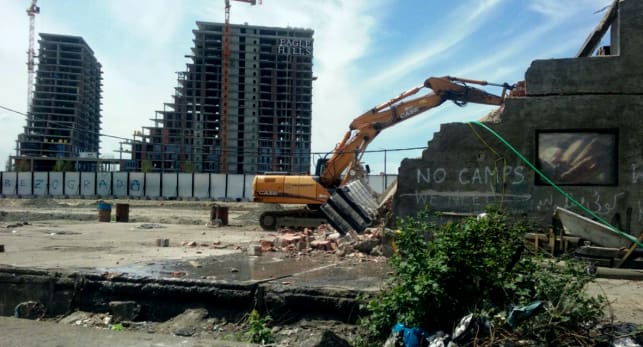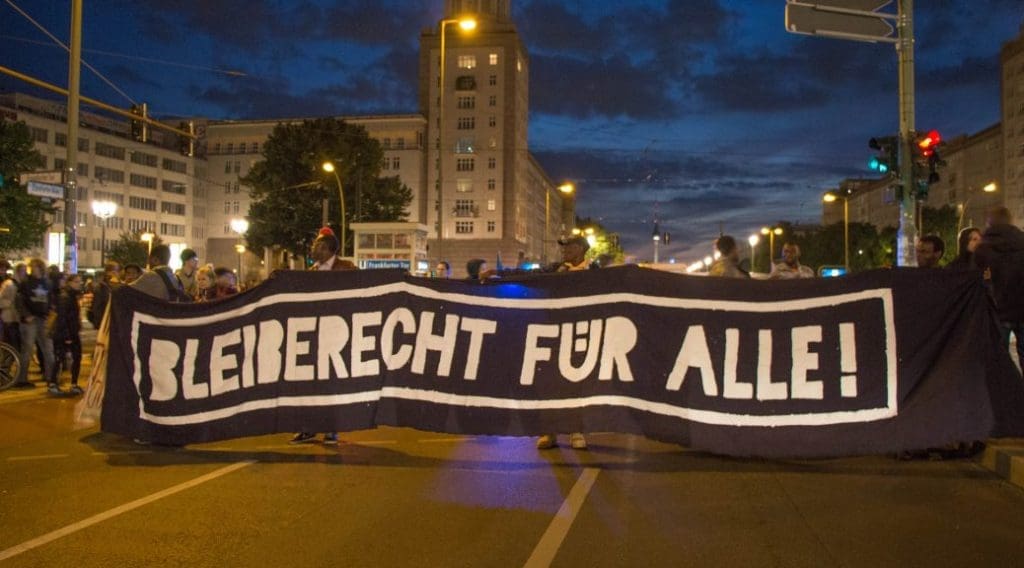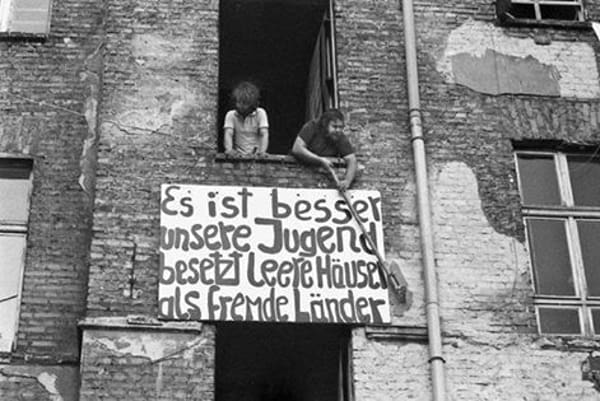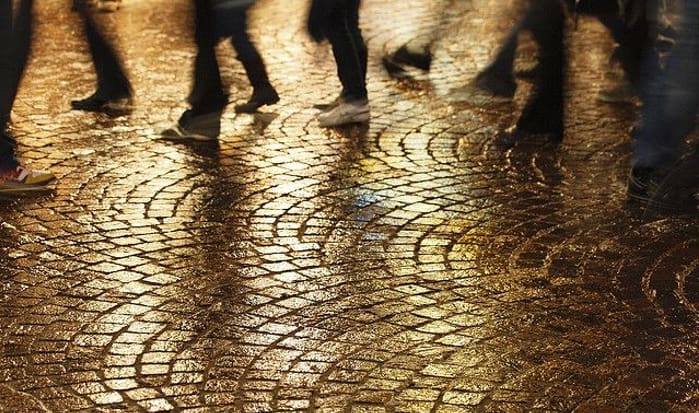AntiNote: What follows are two short articles that should help our readers get up to speed on where things stand in the autonomous movements and self-organized refugee solidarity struggles in Greece. First, a report on Syriza’s recent cannibalistic escalation of repression against parts of its former base in Athens; then, a statement from City Plaza refugee accommodation center in response to this escalation, vowing continued resistance and mutual aid among its residents and in the city and country at large. These alternative structures and cultures of resistance in Greece, while far from ideal, have long been sources of inspiration for members of our writers collective and we feel it is long past time we checked in with them once again.
Renewed State Attacks on Squats
by Ralf Dreis for Ajour Magazin (Switzerland)
21 March 2017 (original post in German / also appeared at Direkte Aktion)
In the early morning hours of 13 March 2017, the Greek police evicted two squatted housing projects in Athens: the self-organized refugee shelter Alkibiádou 9 and the long-standing social center Villa Zográfou.
Elsewhere, in a mid-sized city in Greece’s west, Agrínio, MAT [Monades Apokatastasis Taksis / “Units for the Reinstatement of Order,” Greece’s infamous riot cops] special police stormed an anarchist meeting spot and squat, kicking in doors and busting the place up. Then on 15 March, employees of the city water department in Athens, under police protection, cut the water line to the squatted Embrós Theater.
The cooperative daily newspaper in Athens, Efimerída ton Syntaktón, described these state attacks on squats as a “sequel to the police’s storming and eviction of the legendary Villa Amalías” in December 2012 under the rightwing government of Antónis Samarás (Néa Dimokratía / New Democracy, or ND).
The anarchist movement reacted to the attacks and evictions with furious protests and demonstrations, the occupation of radio stations, and arson attacks. Already on the evening of 13 March in the Athens district of Zográfou, around two thousand people took to the streets after a spontaneous call to action by anarchist and radical left groups. In connection with this demonstration, there were clashes with the forces of repression at Villa Zográfou itself, which had been occupied by police following its eviction. Barricades were erected in the streets, bank windows were smashed, and police were pelted with stones—they responded with tear gas and flash-bang grenades. Over the following few nights there were further attacks on state offices, banks, and police stations in several Greek cities.

The personal information of all 127 of the refugees evicted from Alkibiádou 9 were recorded at the police station Pétrou Rálli, the central immigration enforcement office in Athens. Afterwards most of them were simply put back out on the street, since the authorities had no place for them to stay. Only 31 refugees were taken to state-run shelters. According to police, the eviction was carried out as a result of complaints by the property owner, the Red Cross, which wants to open its own shelter for unaccompanied minor refugees there.
During the eviction of Villa Zográfou, which followed closely on the heels of Alkibiádou’s, the police took seven people into custody for trespassing. The Villa, which is surrounded by a large park, had been occupied since 2011 and served as a cultural center for many social movements and neighborhood initiatives in the districts of Zográfou, Býrona, and Kaisarianí. The myriad activities that took place there included daycare; film-, theater-, and music events; antifa organizing; sustainable organic gardening and agriculture; and political informational meetings.
The police’s storming of the anarchikó stéki, the squatted anarchist meeting spot in Agrínio, was intended above all to intimidate. According to residents there, riot police kicked in doors and searched the entire building, destroying many of its facilities in the process. In the statement they posted on indymedia athens, they also decry the police’s theft of 600 euros which they had collected to put towards the legal defense of a comrade.
In a 15 March statement, residents of the Theater Emprós, which has also been occupied since 2011, called the torn-up sidewalk and the water shutoff “renewed state repression against free, self-organized spaces.” They continued:
This supposedly leftwing government, by repeatedly shutting off water and electricity, wants to rob us of room to breathe. This is the same government that evicts open social centers and self-organized refugee shelters in dawn raids. Thus these former leftwing ‘comrades,’ who greedily absorbed all of the emerging alternative counter-structures to use as stepping stones to power, have now arrived at the political decision to annihilate them. It is of course foolish to have expected otherwise, for every rise to power comes with a simultaneous descent into political amorality.
Syriza is Pandering to the Right
Other leftwing and anarchist organizations hold Syriza and the government of prime minister Aléxis Tsípras responsible for the evictions. The Athens Anti-authoritarian Movement (AK), in their statement on indymedia, reminds readers of the evictions in Thessaloníki in relation to the anti-racist No Border Camp in July 2016. Similarly, the Anarchist Federation finds that this development comes as no surprise: “The role of social democracy and its everlasting lies and tactics have always been known to radical people.”

Since Syriza cannot produce successful outcomes in either its negotiations with the Troika or in the daily lives of Greeks, the party is languishing at around sixteen percent approval in polling. The repression of self-organized structures serves above all to demonstrate their “ability to deal with their internal opponents” and to raise themselves in the esteem of future potential coalition partners. Only days before these police actions, there had been heated verbal altercations in parliament between the government and its opposition. The conservative opposition leader Konstantínos Mitsotákis once again demanded the removal of the current Minister of Public Order and Citizen Protection, Níkos Tóskas, on the grounds he is not doing his job: “When I get into the government, I will cleanse Exárchia” was one of Mitsotákis’s most oft-cited statements from the exchange. For decades, regular, heavy street battles have been taking place in Exárchia between anarchists and police, who many residents of the central Athens district regard as an occupying force.
Tóskas himself defended the evictions as “completely justified” on the radio station Praktorío 104.9: “The building in Zográfou belongs to the city, which wants to use it as a cultural space. The second building belongs to the Red Cross, and will be used to house unaccompanied minors.” As for the refugees themselves, he contended that “it is better anyway that they be in state-organized spaces.” No word from Tóskas about how “state-organized spaces” for refugees in Greece are largely unavailable or that the refugees dwelling in them often have to live under absolutely inhumane conditions. In Athens alone, an estimated four thousand refugees live in squatted, self-organized structures.
The former residents of Villa Zográfou have pointed out that the planned “public cultural use” of the Villa and the surrounding park will in fact be a state conservatory benefiting only a small privileged sliver of the population.
Translated by Antidote
Statement of City Plaza Refugee Accommodation Space
Regarding the rumors on the imminent evacuation of refugee squats and the escalation of anti-refugee policy
3 April 2017 (original post)
CLOSE THE CAMPS OF SHAME, NOT THE REFUGEE HOUSING SQUATS
It looks like the government attack on refugee housing squats is being escalated. Following the evacuation of the Thessaloníki squats in the summer, the Alkiviádou refugee housing squat and Villa Zográfou were evacuated a few weeks ago. Following statements by Minister of Public Order Níkos Tóskas last week regarding the evacuation of refugee housing squats, rumors and leaked information have been circulating, setting the stage for a new round of attacks.
Instead of closing refugee detention centers, ending the apartheid between the Greek mainland and the islands, and housing trapped refugees within cities in dignified housing conditions, the government is ramping up measures against the trapped refugees, preparing to open more closed detention centers, engage in mass deportations and, in order to implement a “policy of deterrence,” is organizing a completely authoritarian neoliberal program against the trapped refugees, thereby becoming a keen implementer of the EU-Turkey deal of shame.
We are certain that the planned attack against refugee housing squats is part of exactly this anti-refugee and anti-migration policy. It is neither an exception nor a diversion. It is completely logical that a government policy that presents refugees as being an enemy within is now adopting a policy of hostility towards any example of dignified living and housing. This is, of course, a continuation of broader anti-grassroots government policies.

As Refugee Accommodation Space City Plaza, we are completely against this racist policy, and we are unwilling to take a single step back in the struggle for dignity, social integration and equality, coexistence between locals and foreign nationals, and solidarity to all those fleeing war and poverty, from Syria to Senegal and from Afghanistan to Morocco. Over the course of a year, over 1,500 refugees and hundreds of people in solidarity, local and international, have been organizing a model for meeting fundamental human needs and a model for social self-organization and multi-ethnic cohabitation. An abandoned hotel on Acharnon is a center of struggle and solidarity at an international scale.
We demand nothing less than the free movement of people, dignified living, the granting of asylum, and equality and freedom for all the people who fled their homes and arrived here. We accept nothing else.
We are here and we will remain here! Don’t even think about it…
—Refugee Accommodation Space City Plaza
Featured image: 13 March 2017 in Athens. Source: Ajour Magazin
Other images: Anarchist News, City Plaza

